Photographs: Amit Dave/Reuters Rahul Jacob
A nation touted at places like the World Economic Forum in Davos a few years ago as an economic superpower in the making is only just beginning to address the problem that only 27 per cent of children in class 5 in its village schools can subtract, says Rahul Jacob.
Narendra Modi's pledge on Sunday to build an Indian Institute of Technology (IIT) and an Indian Institute of Management (IIM) in every state predictably caught the headlines, but the real news in education was the release last Wednesday by Pratham of its Annual Status of Education Report (Aser).
The report shows that children are actually learning less today in schools in rural India than in 2005. The percentage of children in class 5 who can read a class 2 text has declined significantly from 61 per cent in 2005 to 47 per cent in 2013.
The proportion of children who can do division in class 8 has gone from 70 per cent to 46 per cent over the same period.
The irony is parents' aspiration to educate children has never been higher in the country's history.
Enrolment is up to 97 per cent. Even poor parents are making sacrifices aplenty to spend money on tuition - the average tuition expenditure per child from families living in katcha homes is Rs 146.
This makes India's abysmal record at educating 6- to 14-year-olds even sadder.
...
What stops India from being a superpower? Poor education
Image: A schoolgirl (C) prays before having her free mid-day meal, distributed by a government-run primary school, in New Delhi.Photographs: Mansi Thapliyal/Reuters
The Aser scores have actually deteriorated after the Right to Education was introduced in 2009. Between 2005-06 and 2011-12, allocations for primary education rose by 360 per cent.
Utilisation of these funds allocated has been dropping - by 2011-12, about half the money allocated was unspent.
These are not huge amounts on a per capita basis but, as in so many other areas, our sluggish local governments do not have even the competence to spend the money budgeted.
The average cost per child in government schools is about Rs 2,023 annually, but the allocation is more than double that.
...
What stops India from being a superpower? Poor education
Image: A schoolgirl eats her free mid-day meal, distributed by a government-run primary school, in New DelhiPhotographs: Mansi Thapliyal/Reuters
The only good news is that for the first time this year the annual work guidelines of the Sarva Shiksha Abhiyan, the government programme for primary education, have language that point to learning outcomes rather than just the importance of teachers completing the syllabus or the necessity to build infrastructure in schools.
Rukmini Banerji, who heads the Aser project, is an energetic optimist. But when I asked Ms Banerji if she had an explanation for the lack of urgency on primary education while news about IITs and IIMs routinely dominates the headlines, even she sounded fatigued.
"People have woken up to [the importance of learning outcomes] a little late. It has taken many, many years," she replied, pointing out that this new emphasis was still at the policy level. This battle to improve how children actually learn in classrooms across India will only begin this summer in the new school year.
...
What stops India from being a superpower? Poor education
Image: Shool children in coloured clothes form India's flag as they participate in a full-dress rehearsal for the country's Independence Day celebrations at the historic Red Fort in Delhi.Photographs: Reuters
To put the challenge in perspective, a nation touted at places like the World Economic Forum in Davos a few years ago as an economic superpower in the making is only just beginning to address the problem that only 27 per cent of children in class 5 in its village schools can subtract.
Yasheng Huang, an economist at the Massachusetts Institute of Technology, makes the point that our political leaders overlook the huge investments in education and healthcare made by China under Mao and Deng Xiaoping and obsess instead about the country's shiny skyscrapers and six-lane highways.
...
What stops India from being a superpower? Poor education
Photographs: Reuters
In a sense, the recent focus on building classrooms, kitchen sheds and boundary walls has overshadowed the problem that the majority of students in class are struggling to keep up.
Yamini Aiyar, who contributed to the Aser report, recounts the story of a headmaster in Nalanda receiving a grant to build a boundary wall even though he had not made a request for it.
"The wall was sanctioned at the state level and finalised at the district level," writes Ms Aiyar. That was all well and good, but the main problem, the headmaster said, was that the children lacked clean water to drink and kept falling sick.
...
What stops India from being a superpower? Poor education
Photographs: Reuters
If at the district level what might be characterised as a Public Works Department approach to dealing with education prevails, there is also rigid pressure on teachers to complete the curriculum.
The Right to Education Act emphasises completing the syllabus. This puts pressure on kids from class 1 itself because many enrolled in government schools start at school without the benefit of kindergarten.
These five-year-olds, Ms Banerji says, are often "not even aware their noses are running or can tell their right chappal from their left chappal" and quickly fall behind.
One overlooked reason for the better scores at private schools in Indian villages is that not only do the teachers regularly turn up at school to teach, unlike government teachers, but the children usually start at age six, a year later than those at government schools, having benefited from preschool.
...
What stops India from being a superpower? Poor education
Image: A man rides a motorcycle carrying six children on their way back home from school at Greater Noida.Photographs: Parivartan Sharma/Reuters
It would need a very detail-oriented future prime minister to move primary education up the list of priorities of district collectors across the country.
Rural Gujarat scores well on building infrastructure in schools, but much less well on learning outcomes - only 17 per cent of students in class 5 can do division.
On the day the Aser report was released last week, Mr Modi was addressing the Federation of Indian Chambers of Commerce and Industry and describing India as a "country of under-achievers".
This is true enough, but one of the principal reasons is that India's leaders have been obsessed with IITs and IIMs and spend far too little time worrying about whether children in village schools can actually read, add and subtract.

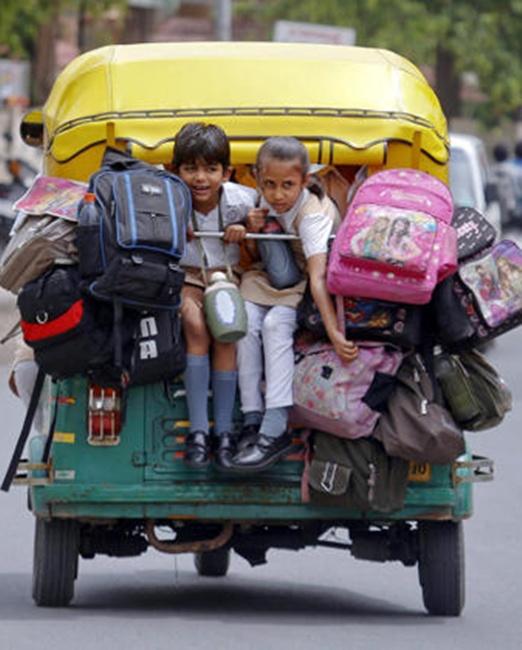
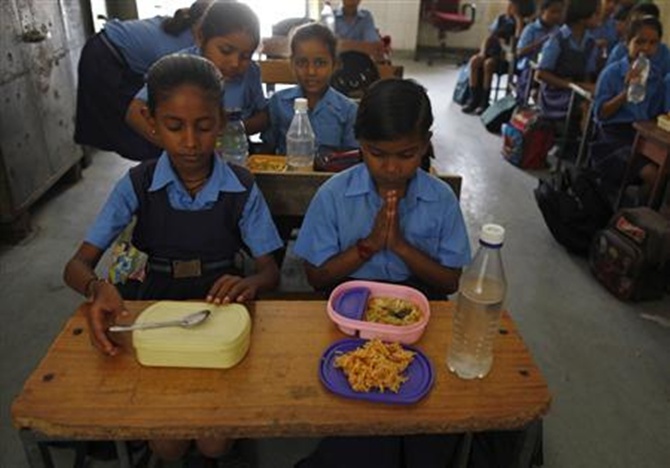
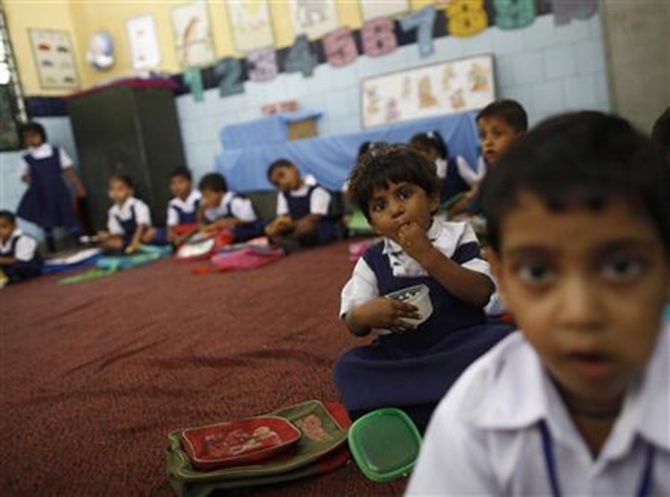
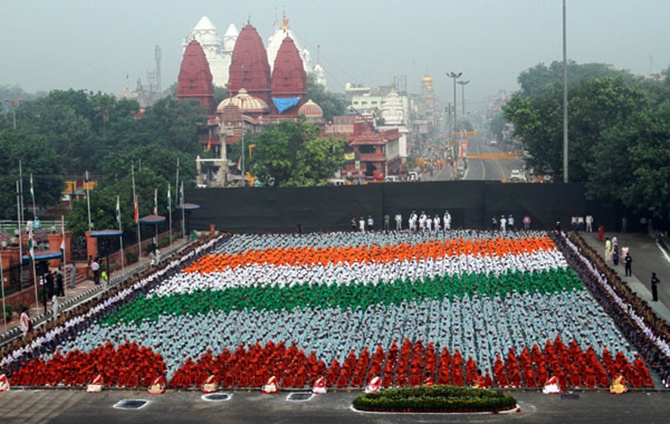
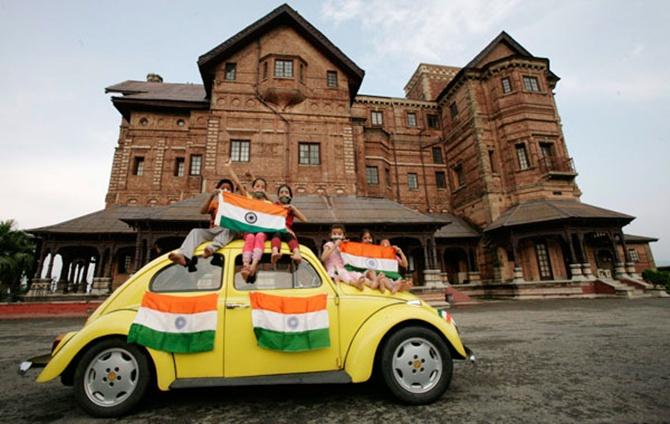
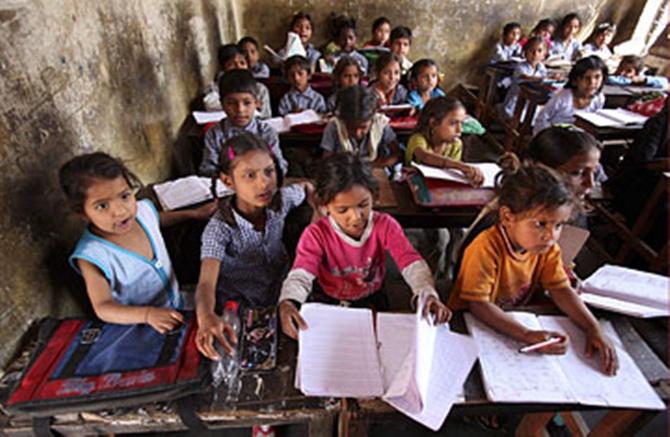
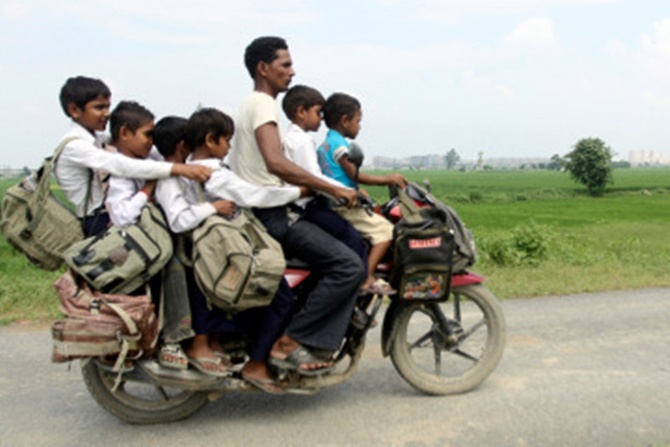

article